Can Dogs Use Inflatable Swimming Pools?
Can Dogs Use Inflatable Swimming Pools? With the summer heat bearing down, many dog owners look for ways to help their furry friends cool off. One popular option is using an inflatable swimming pool. But is it a good idea to let your dog take a dip in one of these pools? The short answer is yes, dogs can use inflatable swimming pools, but there are a few important considerations to ensure their safety and enjoyment.
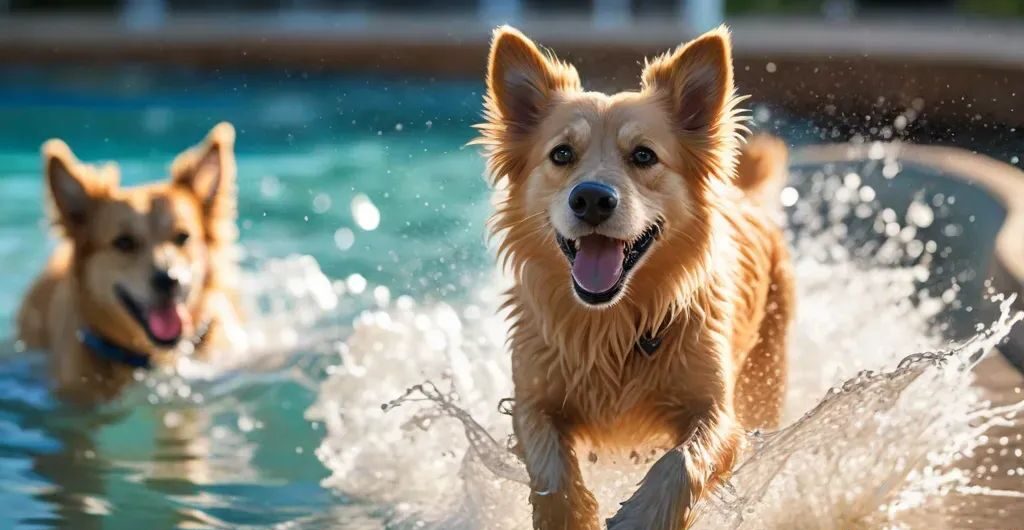
Benefits of Inflatable Swimming Pools for Dogs
1. Cooling Off: Just like humans, dogs can overheat during the summer. An inflatable pool provides a quick and easy way for them to cool down. The water helps regulate their body temperature, which is especially important for breeds prone to overheating, like Bulldogs or Pugs.
2. Exercise and Fun: Swimming is a great low-impact exercise for dogs. Exercise helps to improve cardiovascular health, strengthens muscles, and is gentle on joints. For dogs that love water, an inflatable pool can also be a source of endless fun and play.
3. Easy to Set Up and Store: Inflatable pools are convenient because they’re easy to set up, take down, and store when not in use. They’re also more affordable than permanent pools, making them an accessible option for many dog owners.
Considerations for Using Inflatable Pools with Dogs
1. Size and Stability: Choose a pool that is large enough for your dog to move around comfortably. The pool should also be sturdy enough to support your dog’s weight without tipping over or collapsing. A pool that is too small or unstable could lead to accidents or injuries.
2. Material Durability: Dogs, especially larger breeds or those with sharp nails, can easily puncture or tear an inflatable pool. Some pools are specifically designed for pets, with reinforced sides and tougher materials.
3. Safety Precautions: Never leave your dog unattended in the pool, even if they seem confident and comfortable. Dogs can panic if they suddenly feel unstable or if the water level is too high. It’s also important to ensure the water is clean and not too deep. Shallow water is usually sufficient for most dogs to cool off and play safely.
4. Gradual Introduction: If your dog is new to swimming or unfamiliar with inflatable pools, introduce them gradually. Start by filling the pool with a small amount of water and allowing them to explore it at their own pace. You can use toys or treats to encourage them to enter the pool and build positive associations with it.
5. Maintenance: Keep the pool clean by regularly changing the water and cleaning the pool surface. This helps prevent the buildup of bacteria and algae, which could be harmful to your dog’s health. After each use, rinse your dog off to remove any chlorine, dirt, or debris that may have accumulated.
6. Comfort and Temperature: Make sure the water temperature is comfortable for your dog. Cold water might be refreshing on a hot day, but water that is too cold could cause discomfort or even hypothermia, especially for small or short-haired breeds. Likewise, water that’s too warm may not provide the cooling effect your dog needs.
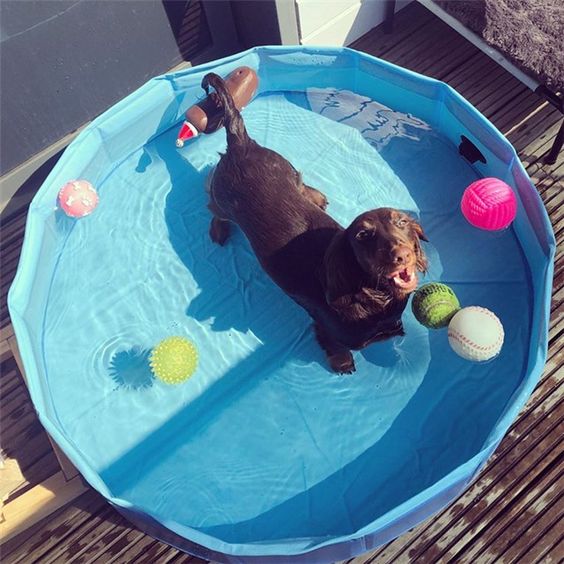
Types of Dog Pools: Choosing the Right One
As temperatures rise, dog owners often look for ways to help their furry friends cool off and stay hydrated. A dog pool is a great solution, offering a safe and fun environment for your pet to splash around. But with various types of dog pools available, choosing the right one can be overwhelming. Here’s a guide to help you make the best choice for your dog’s needs.
1. Inflatable Pools
Overview: Inflatable dog pools are lightweight, portable, and easy to set up. They can be quickly inflated and deflated, making them ideal for limited spaces or for those who want a pool that can be easily stored away when not in use.
Pros:
- Portable and Easy to Store: Inflatable pools can be deflated and stored away when not in use, making them a space-saving option.
- Affordable: Generally more budget-friendly than other types of pools.
- Quick Setup: These pools can be set up in minutes and don’t require any special tools or equipment.
Cons:
- Durability Concerns: Dogs with sharp nails or those that love to chew can easily puncture inflatable pools, leading to leaks or complete deflation.
- Stability: Inflatable pools may not be as stable as other types, especially for larger or more active dogs.
Best For: Small to medium-sized dogs or dogs that are gentle with their play. Ideal for temporary use or occasional cooling off.
2. Rigid Plastic Pools
Overview: Rigid plastic pools are made from hard, durable plastic. They are often designed specifically for pets, with shallow sides and reinforced edges.
Pros:
- Durable: Hard plastic is resistant to scratches, punctures, and general wear and tear, making it a long-lasting option.
- Easy to Clean: These pools are easy to rinse out and maintain.
- Stable: The rigid structure provides stability, making it safe for more active dogs.
Cons:
- Less Portable: These pools are not as easy to move or store as inflatable options, as they don’t collapse.
- Size Limitations: Rigid plastic pools are typically smaller in size, which may not be suitable for larger breeds.
Best For: Active dogs or those with a tendency to chew. This is good for both indoor and outdoor use and have enough space.
3. Folding Dog Pools
Overview: Folding dog pools are made from durable, collapsible panels that allow the pool to be easily folded up and stored away when not in use. These pools often have a non-slip bottom and reinforced sides for added durability.
Pros:
- Durable and Scratch-Resistant: Designed with dogs in mind, these pools are often made from reinforced materials that can withstand nails and rough play.
- Portable and Easy to Store: Like inflatable pools, folding pools can be collapsed and stored, but they are generally more durable.
- Easy Setup: No inflation is required; simply unfold the pool and fill it with water.
Cons:
- Price: Folding pools are typically more expensive than inflatable or rigid plastic pools.
- Potential for Leaks: While durable, the folding seams can sometimes be a weak point if not properly cared for.
Best For: Dogs of all sizes, especially those who are more active or rougher on their toys and play areas. This is good for temporary and permanent use.
4. In-Ground or Semi-In-Ground Pools
Overview: These pools are permanent fixtures in your yard and can be custom-built to suit your dog’s needs. They can be fully in-ground or partially above ground.
Pros:
- High Durability: These pools are built to last and can withstand all types of play and weather conditions.
- Customizable: You can design the pool to match your dog’s size, swimming ability, and your backyard’s layout.
- Luxury Option: In-ground pools can double as a human and dog pool, providing a luxurious cooling option for both.
Cons:
- Cost: In-ground pools are the most expensive option, both in terms of installation and maintenance.
- Permanent: Once installed, these pools cannot be moved or stored away, making them a significant commitment.
Best For: Owners with large yards and multiple dogs, or those looking for a long-term investment in their dog’s health and happiness.
5. Stock Tanks
Overview: Originally designed for livestock, stock tanks have become a popular choice for dog pools. Made from galvanized metal or heavy-duty plastic, these tanks are extremely durable and come in various sizes.
Pros:
- Durable: Built to withstand harsh conditions, these tanks are virtually indestructible for most dogs.
- Variety of Sizes: Stock tanks come in a range of sizes, making them suitable for both small and large dogs.
- Unique Aesthetic: The rustic look of a stock tank can add a unique charm to your backyard.
Cons:
- Weight: Stock tanks can be heavy and difficult to move, especially when filled with water.
- No Drainage: Many stock tanks don’t come with a built-in drain, making them harder to empty and clean.
Best For: Larger dogs or households with multiple pets. Ideal for those who want a durable, long-lasting pool option.
Top Picks for the Best and Safest Dog Pools
Choosing the right pool for your dog involves considering factors like size, durability, ease of use, and safety features. Here are some top picks that balance these aspects to provide the best and safest options for your furry friend.
1. FrontPet Foldable Dog Pool
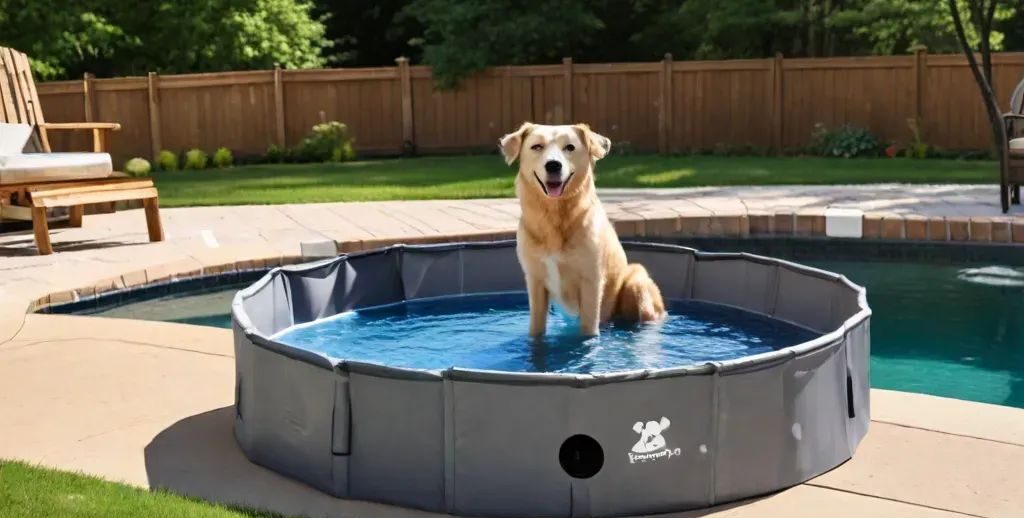
Best For: All Dog Sizes
Why It’s Great:
- Durable Material: Made from strong PVC material, this foldable pool is resistant to scratches and punctures, making it suitable for even the most active dogs.
- Portable and Easy to Store: The pool folds down easily, making it simple to transport and store when not in use.
- Non-Slip Bottom: The non-slip bottom adds an extra layer of safety, preventing your dog from slipping while they play.
- Easy Drainage: Equipped with a drainage plug, it’s easy to empty and clean.
Considerations: Although it’s durable, it’s important to ensure your dog’s nails are trimmed to avoid accidental punctures.
2. Jasonwell Foldable Dog Pool
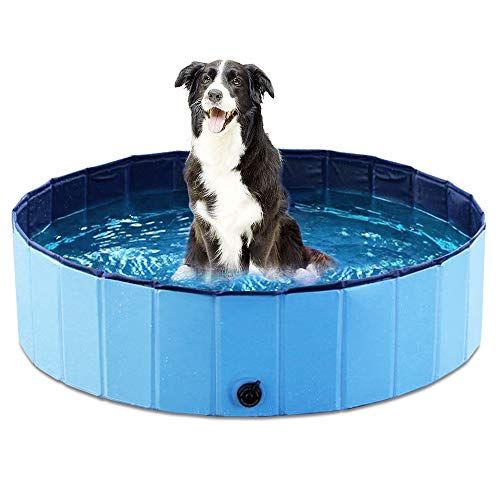
Best For: Medium to Large Dogs
Why It’s Great:
- Heavy-Duty Material: The pool is made from thick PVC and has a durable build to withstand rough play.
- Foldable Design: It’s easily foldable, making it convenient to set up and store away.
- Quick Drainage: A well-placed drainage valve allows for quick and easy emptying.
- Variety of Sizes: Available in different sizes to suit different breeds and needs.
Considerations: While it’s sturdy, placing the pool on a smooth, level surface will prolong its lifespan and improve stability.
3. KOPEKS Outdoor Swimming Pool
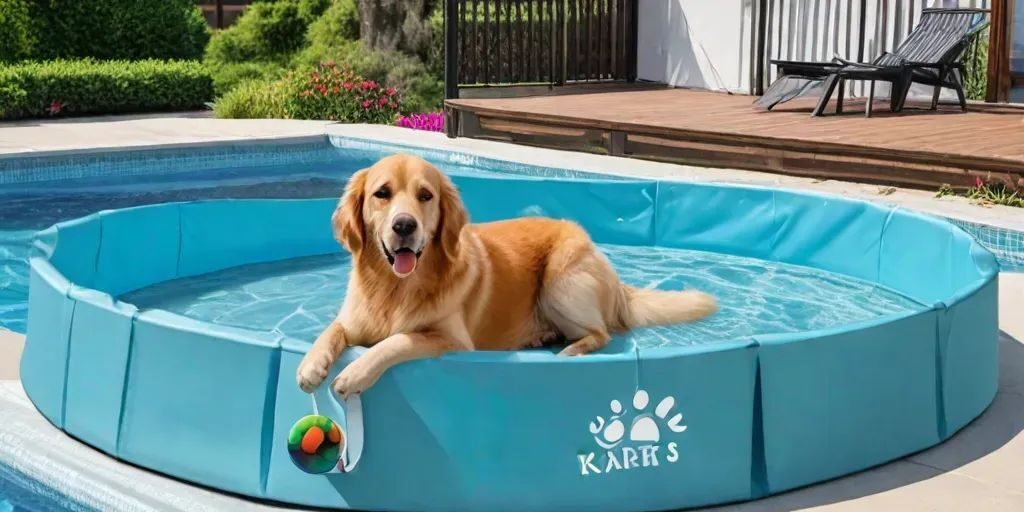
Best For: Large Breeds
Why It’s Great:
- Extra-Large Size: This pool offers ample space for larger breeds or multiple dogs to play and relax.
- Sturdy Construction: Made from industrial-strength PVC, it’s built to last and resist wear and tear.
- No Inflation Required: The pool is easy to set up with no need for inflation—just unfold and fill with water.
- Easy to Clean: The smooth surface and drainage plug make cleaning and maintaining the pool simple.
Considerations: The pool’s large size may require more space, so ensure you have enough room for it in your yard.
4. Intex Mini Frame Pool
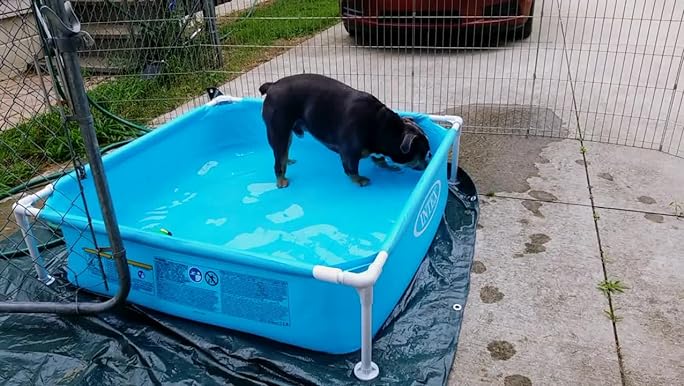
Best For: Small to Medium Dogs
Why It’s Great:
- Metal Frame: This pool is supported by a sturdy metal frame, making it a stable and durable option for small to medium-sized dogs.
- Puncture-Resistant Material: The pool liner is made from puncture-resistant material, providing an added layer of protection against scratches.
- Easy Setup: The frame snaps together easily, and the pool can be set up in minutes.
- Affordable Option: This pool offers a great balance between quality and price, making it an excellent value.
Considerations: The metal frame provides stability, but it’s best for smaller dogs to prevent any potential tipping.
5. One Dog One Bone Paw Shaped Pool
Best For: Long-Term Use and Unique Design
Why It’s Great:
- Heavy-Duty Construction: Made from truck bed liner material, this pool is nearly indestructible and built to last for years.
- Unique Design: The fun paw shape adds a playful touch to your yard while providing ample space for your dog to enjoy.
- UV-Resistant: The pool is UV-resistant, so it won’t fade or crack when exposed to the sun.
- Low Maintenance: Easy to clean and maintain, making it a great long-term investment.
A Few Safety Tips for Doggy Pools
Doggy pools can be a fantastic way for your furry friend to cool off and have fun, but safety should always be a priority. Here are some essential safety tips to keep in mind when using a dog pool:
1. Always Supervise Your Dog
- Stay Alert: Never leave your dog unattended in the pool, even if they are a strong swimmer. Accidents can happen quickly, and it’s important to be there to assist if needed.
- Be Nearby: Stay close enough to quickly intervene if your dog shows signs of distress or if the pool becomes unstable.
2. Use a Non-Slip Surface
- Prevent Slipping: Place the pool on a flat, non-slippery surface to prevent the pool from shifting and to reduce the risk of your dog slipping when entering or exiting the pool.
- Non-Slip Mats: Consider using non-slip mats around the pool area to further enhance safety, especially if the surrounding surface gets wet and slippery.
3. Monitor Water Temperature
- Avoid Extremes: Check the water temperature before letting your dog enter the pool. Water that is too cold can cause discomfort or shock, while water that is too warm may not provide the cooling effect your dog needs.
- Adjust Accordingly: On very hot days, change the water more frequently to keep it cool. In cooler weather, ensure the water isn’t too cold for your dog to enjoy.
4. Keep Nails Trimmed
- Prevent Punctures: Make sure your dog’s nails are trimmed before they use the pool. Sharp nails can puncture inflatable pools and damage other types of pools as well.
- Regular Maintenance: Regularly check and trim your dog’s nails to maintain a safe and enjoyable pool experience.
5. Introduce the Pool Gradually
- Ease Into It: If your dog is new to swimming or using a pool, introduce them to it gradually. Let them explore the pool without water first, and then slowly add a small amount of water.
- Positive Reinforcement: Use treats, toys, and praise to create positive associations with the pool, helping your dog feel more comfortable and confident.
6. Keep the Pool Clean
- Regular Cleaning: Empty and clean the pool regularly to prevent the buildup of dirt, algae, or harmful bacteria. Rinse your dog off after each swim to remove chlorine, dirt, or debris.
- Use Fresh Water: Fill the pool with fresh, clean water each time it’s used to ensure your dog is swimming in a safe environment.
7. Be Aware of Pool Depth
- Shallow Water: Ensure the water depth is appropriate for your dog’s size and swimming ability. For most dogs, shallow water is sufficient for cooling off and playing.
- Avoid Overfilling: Don’t overfill the pool, especially for smaller dogs or those that aren’t strong swimmers, as this could create a drowning risk.
8. Know Your Dog’s Limits
- Watch for Signs of Fatigue: Pay attention to signs that your dog is getting tired, such as heavy panting, slowing down, or trying to exit the pool. Allow them to rest and take breaks as needed.
- Hydration: Ensure your dog stays hydrated by providing fresh drinking water, as swimming and playing in the pool can be exhausting.
9. Use a Life Jacket for Swimming
- Safety Gear: If your dog is not a confident swimmer, consider using a dog life jacket, especially in deeper pools or if the pool has a larger volume of water.
- Ensure Proper Fit: Make sure the life jacket fits snugly and has handles so you can easily assist your dog if needed.
10. Be Mindful of Pool Chemicals
- Use Pet-Safe Products: If using a larger pool with chemicals like chlorine, ensure they are safe for pets. Avoid using harsh chemicals that could irritate your dog’s skin or eyes.
- Rinse After Swimming: Rinse your dog with clean water after swimming in a chlorinated pool to remove any residue.
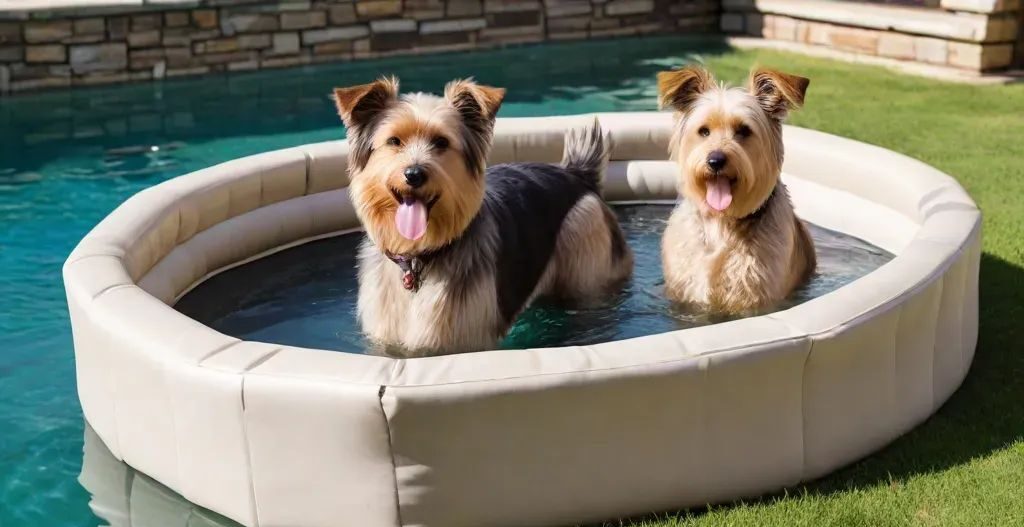
Leave a Reply